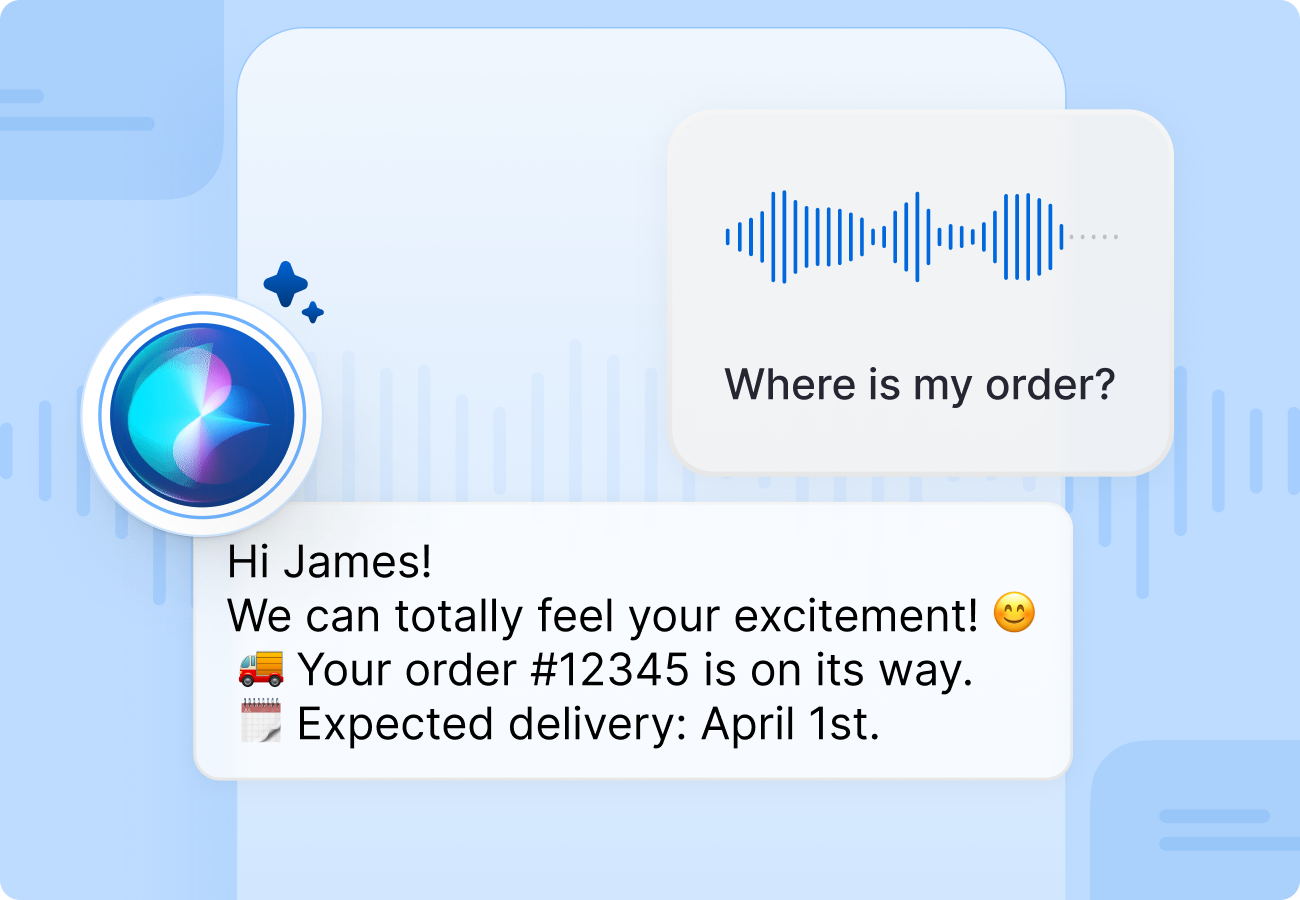Customer experience is witnessing a voice-first evolution. In 2025, voice-based AI customer service agents are a competitive edge for enterprises. Built on powerful large language models (LLMs), these agents understand natural speech, engage in contextual conversations, and resolve queries autonomously and in real-time.
Enterprises are embracing voice AI to meet rising customer expectations of fast, intuitive support while reducing call center overhead and latency. Whether it’s handling routine inquiries or navigating multi-step journeys, voice agents are redefining what seamless customer service looks like.
In this blog, we’ll unpack how voice-based AI agents work, their benefits, and why they’re indispensable in future-ready CX strategies.
ALSO READ: How Voice Agents are Redefining Industries
What are Voice-Based AI Customer Service Agents?
They are intelligent systems that engage in natural, two-way voice conversations without predefined scripts or human intervention. Unlike traditional IVR systems that follow rigid paths, these agents are built on large language models, enabling them to understand context, respond intelligently, and handle dynamic, branching conversations in real-time.
These agents not only detect keywords but also grasp intent, manage shifts in sentiment, and resolve queries like order tracking, appointment booking, and troubleshooting. Available 24/7, they reduce wait times, increase resolution rates, and deliver effortless support experiences for customers who prefer speaking over typing.
For enterprises, voice AI agents are a strategic enabler of customer experience. Deployed in banking, healthcare, retail, and real estate verticals, they help streamline operations while maintaining the human-like empathy and fluency customers expect.
How Do Voice-Based AI Customer Service Agents Work?
Voice-based AI agents convert real-time speech into intelligent, goal-oriented actions. The process starts with speech-to-text (STT) conversion, where the user’s speech input is transcribed with high accuracy and low latency. The text is then passed through an LLM-powered engine that interprets the query, understands the user intent, and generates a natural, context-aware response.
Voice agents retain memory across turns, enabling fluid, multi-step conversations without needing users to repeat information. Once a response is generated, it’s converted back to speech via text-to-speech (TTS) synthesis, making the entire experience feel intuitive and human-like.
The real power lies in how these agents can integrate with backend systems - CRMs, order management platforms, payment gateways, and more - to execute tasks in real-time. Whether it's checking delivery status, rescheduling appointments, or collecting feedback, voice agents do it all with minimal friction.
This closed-loop capability makes them far more than just virtual assistants. They act as autonomous customer experience engines, resolving queries end-to-end while delivering the immediacy today’s customers expect.
Benefits of Voice-Based AI in Customer Service
AI voice agents are transforming customer service by offering businesses a powerful mix of speed, scalability, and higher engagement.
- Faster resolutions: Voice AI agents handle queries instantly without customers waiting in queue. With real-time understanding and response, they reduce average handling time and boost first-call resolution.
- Higher efficiency: By automating high-volume, repetitive voice queries, enterprises can significantly reduce the load on human agents - freeing them for more complex tasks.
- Human-like conversations: Unlike legacy IVR systems, voice agents speak in natural tones, manage emotion, and respond empathetically - delivering experiences that feel personal, not robotic.
- 24/7 availability: Voice agents ensure round-the-clock support, especially valuable for global businesses serving customers in multiple time zones.
- Multilingual: With support for multiple languages, voice AI allows brands to connect with customers in their preferred language, broadening accessibility.
- End-to-end automation: From booking appointments to tracking orders, these agents can handle entire workflows through voice - reducing drop-offs and improving efficiency.
In essence, voice-based AI agents are reshaping support from reactive to proactive - helping enterprises deliver faster, smarter, and more empathetic service at scale.
Top Use Cases and Examples
Voice-based AI agents are being adopted across industries to streamline support, boost efficiency, and elevate customer experience.
- Order tracking & status updates: In eCommerce and retail, voice agents provide real-time updates on orders, refunds, and deliveries.

- Appointment scheduling: In healthcare, insurance, and real estate, voice AI helps customers book, reschedule, or cancel appointments for doctor visits, vehicle inspection, site visits, among others, effortlessly.
- Lead qualification & follow-ups: Sales teams use voice agents to qualify leads, capture preferences, and even nudge prospects with timely follow-ups.
- Account management: Banking and fintech players use voice agents for balance checks, payment reminders, and transaction history safely and securely.
- Post-purchase support: From warranty claims to service requests, voice agents manage common queries, freeing up human agents for complex issues.
Voice AI Agents vs Text-Based AI Agents
While both voice and text-based AI agents help automate customer interactions, they serve different user preferences and use cases.
Voice AI agents enable natural, spoken conversations for users who prefer talking over typing or for scenarios like driving, elder care, or regional language support. They offer immediacy, emotional nuance, and are especially effective in high-touch, real-time interactions.
Text-based AI agents, on the other hand, are suited for multitasking customers who prefer messaging apps or web chat. They excel in handling structured queries, FAQs, and transactional workflows.
Together, voice and text agents form a powerful omnichannel support system, ensuring brands meet customers where they are, with the right modality at the right moment.
Getting Started: Implementing Voice-Based AI for Customer Service
To implement voice AI effectively, start by identifying high-impact use cases like handling FAQs, appointment scheduling, or lead qualification. Then choose a platform that ensures natural voice synthesis, low-latency performance, and multilingual fluency.
.png?width=900&height=287&name=AI%20lead%20Qualification%20Agent%20(1).png)
Haptik’s voice AI agents are built for enterprise-scale offering best-in-class response times, secure-by-design architecture, built-in smart handovers to human agents, and seamless integration with your existing tech stack including CRMs, contact center platforms, and more.
From intelligent call routing to proactive engagement, Haptik makes it easy to launch voice AI experiences that are empathetic, efficient, and enterprise-grade.
Track KPIs like call deflection, CSAT, and first-call resolution to drive continuous improvement and maximize ROI.
Final Thoughts: Is Voice-Based AI Right for Your Support Strategy?
If your customers expect fast, human-like support with minimal friction, voice-based AI is a strategic priority. With the ability to understand natural language, adapt to tone, and integrate with your existing systems, voice AI agents elevate every touchpoint. Backed by low latency, smart handovers, and multilingual support, Haptik makes it easy to future-proof your customer service with intelligent, conversational voice experiences.
FAQs
Haptik’s agents are secure by design, adhering to global standards like GDPR, with data encryption and access controls.






